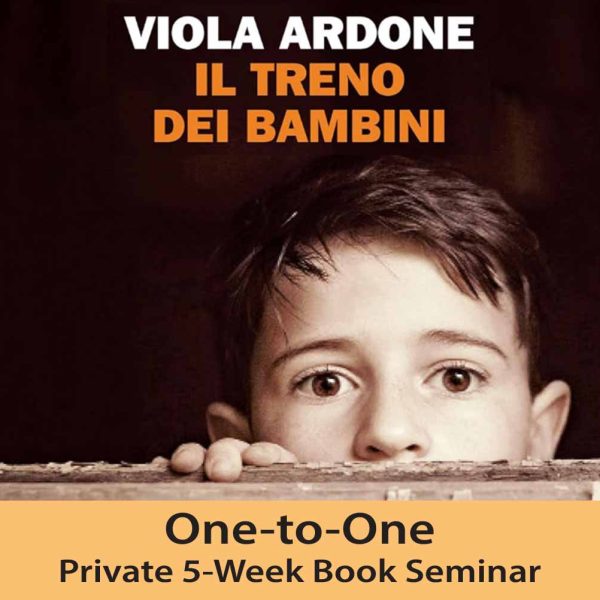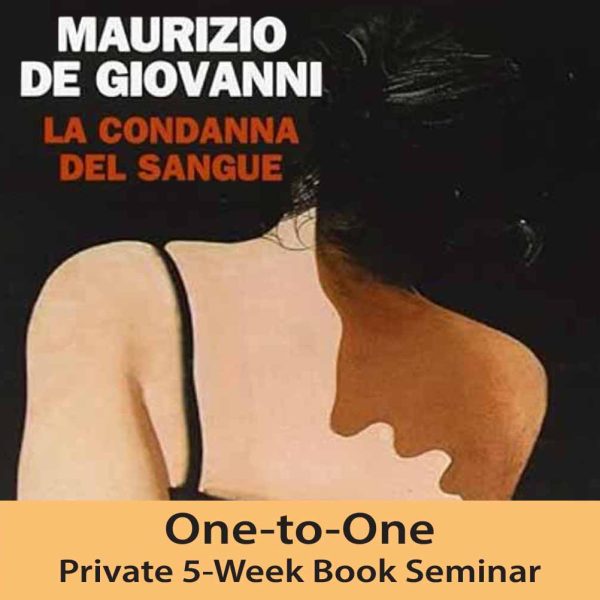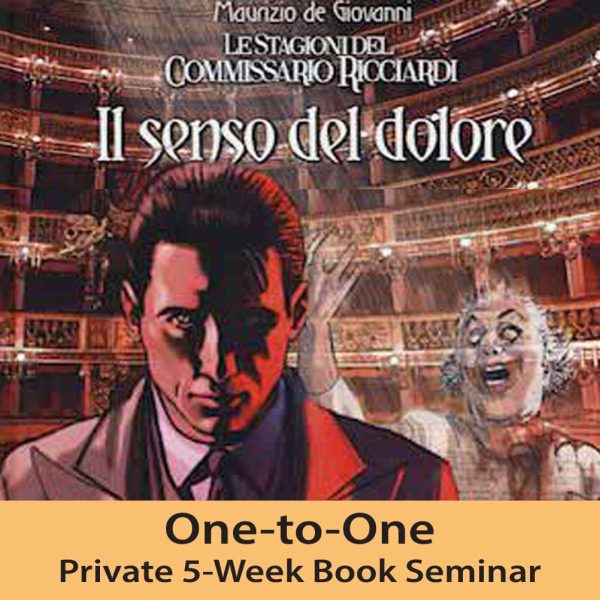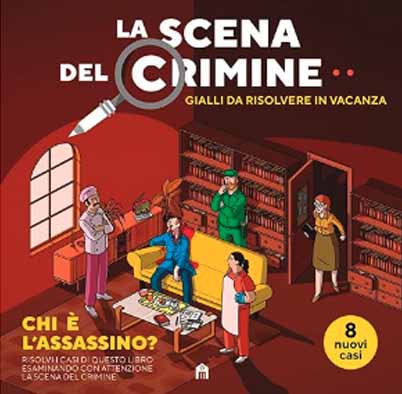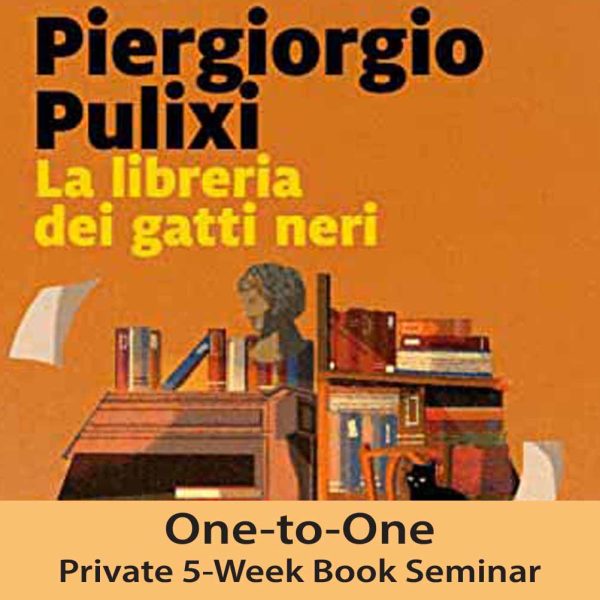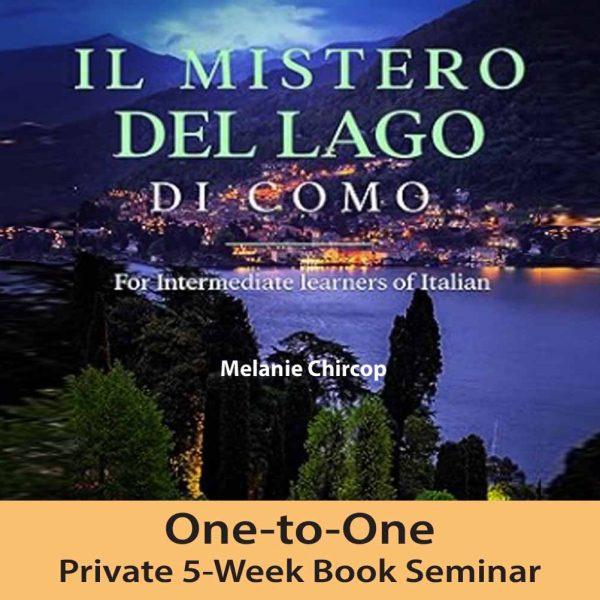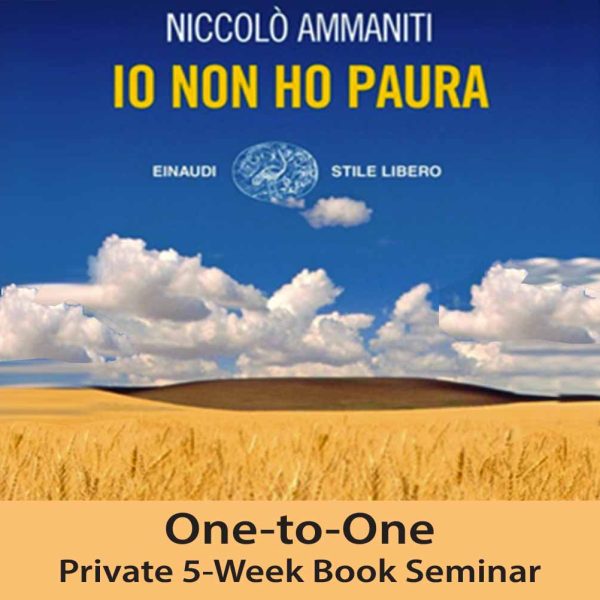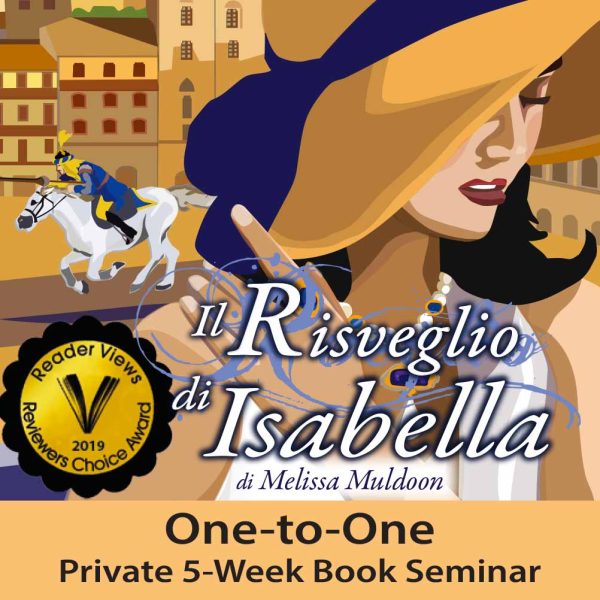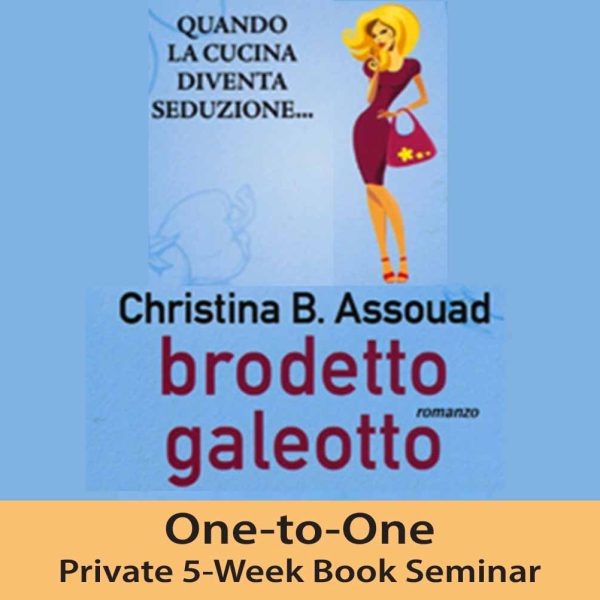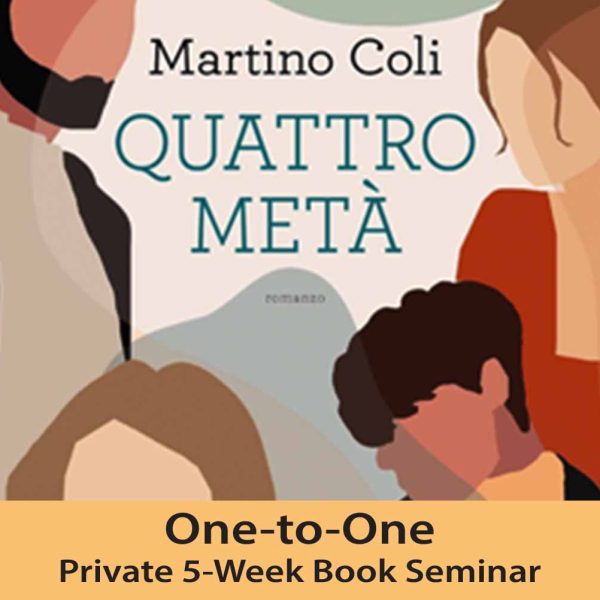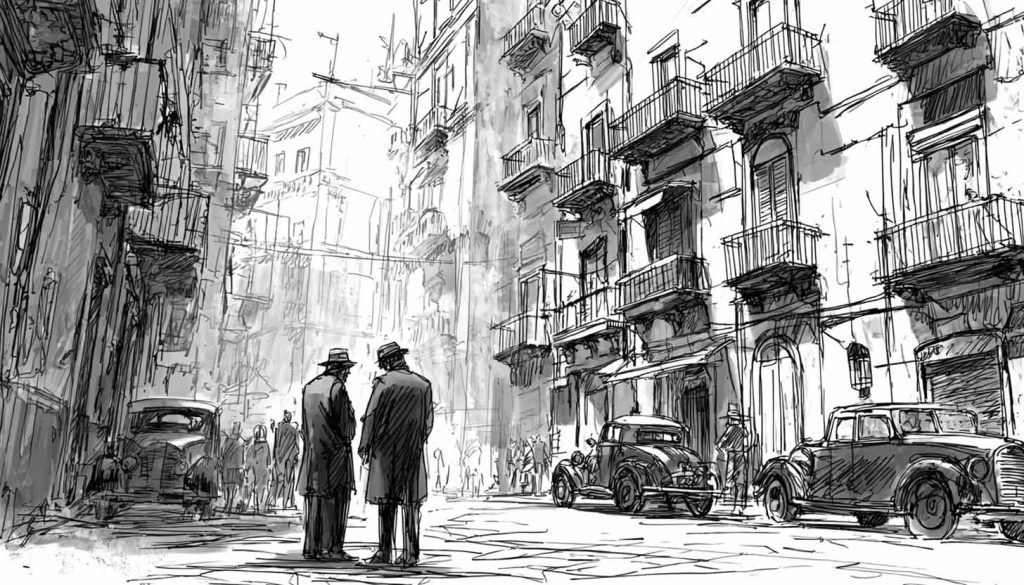
Il Commissario Ricciardi si unisce al Matta Book Club!
Commissario Ricciardi joins to the Matta Book Club!
Note del lettore per “Commissario Ricciardi” disponibili!
Reader Notes for “Commissario Ricciardi” are now available!
Per i membri del club del libro sono online le note del lettore e i punti di discussione per il Matta Book Club Autunno 2025! Questa stagione leggiamo Il senso del dolore di Maurizio de Giovanni, il primo libro della serie con l’indimenticabile Commissario Ricciardi.
For book club members the reader notes and discussion prompts for the Fall 2025 Matta Book Club are now posted! This season, we’re diving into Il senso del dolore by Maurizio de Giovanni, the first book in the unforgettable Commissario Ricciardi series.
Joining the Matta Book Club means more than just reading—it’s an immersive literary and cultural adventure.
When you join a Matta Book Club group or individual reading experience, you’ll unlock exclusive access to a password-protected hub of Reader Notes and in-depth discussion materials designed to enrich your journey through the novel.
What you will receive when you become a Matta Book Club Member you will have access to valuable links to downloadable & printable documents:
Strategies for reading an Italian novel with confidence and enjoyment.
Plot points and themes for deeper understanding and appreciation of the novel..
Chapter-by-chapter summaries and reader questions in Italian and English, with summaries and Italian quotes taken directly from the text.
Cultural context with images of key Neapolitan locations where the story unfolds.
Language insights, such as the use of the voi form in the 1930s, when Mussolini attempted to ban lei.
Narrative style analysis, exploring de Giovanni’s omniscient narrator & distinctive voice.
Character name explorations, uncovering hidden meanings and nuances.
Vocabulary list of 300+ words, download and practice the key terms from the novel with English translations.
Five, one-hour Book Discussions guided by Melissa, practice your Italian conversation with other language learners in a warm and friendly environment.
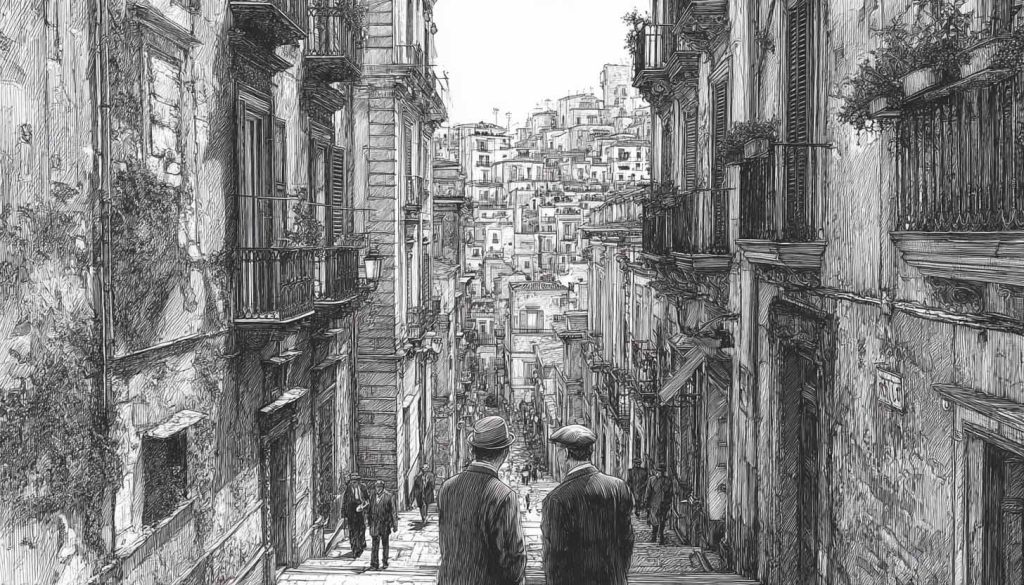
I vicoli, la gente e i luoghi di Napoli negli anni ’30
The streets, people and places of Napoli in the 1930s
Ambientata a Napoli negli anni ’30, la storia ci porta dietro le quinte del Teatro San Carlo e nelle strade popolari e aristocratiche della città. Qui seguiamo Luigi Alfredo Ricciardi, commissario nobile e solitario, dotato di un potere inquietante: vede i fantasmi delle vittime di morte violenta e ne ascolta le ultime parole.
Set in 1930s Naples, the story takes us behind the velvet curtains of the Teatro San Carlo and into the bustling streets of the city. Here we meet Luigi Alfredo Ricciardi, a noble yet lonely commissioner who carries a chilling gift: he can see the ghosts of the violently dead and hear their final words.
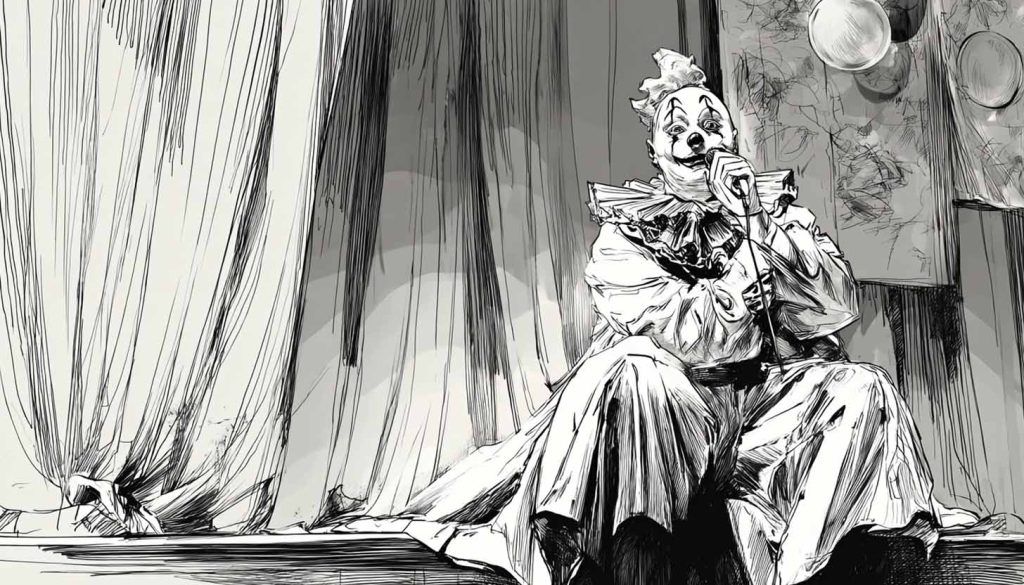
L’indagine: un tenore assassinato
The Investigation: a Murdered Tenor
Il mistero ruota attorno a Arnaldo Vezzi, un tenore di fama mondiale noto tanto per la sua arroganza quanto per la sua voce. La sera del suo morto interpreta Canio, il pagliaccio tormentato nei Pagliacci — un ruolo che riflette la sua stessa natura crudele e gelosa. Ma prima che il sipario cali, Vezzi viene trovato assassinato nel suo camerino.
The mystery centers on Arnaldo Vezzi, a world-famous tenor known as much for his arrogance as for his voice. On the night of his death, he plays Canio, the tormented clown (pagliaccio) in Pagliacci—a role that mirrors his own cruel, jealous nature. But before the curtain can fall, Vezzi is found murdered in his dressing room.
Vezzi era un beniamino di Mussolini, idolatrato dal regime, eppure disprezzato da quasi tutti quelli che lo conoscevano davvero (e diciamolo — chi non trova i pagliacci un po’ inquietanti, e forse perfino bersagli adatti a oscure vendette?).
Vezzi was a favorite of Mussolini, adored by the regime, yet despised by nearly everyone who truly knew him (and let’s be honest—who doesn’t find clowns a little terrifying, and maybe even fitting targets for dark mischief?).
Tra i sospettati ci sono la sua affascinante moglie Livia, il personale del teatro che sopportava i suoi capricci e coloro che covavano vecchi rancori in silenzio. Indagando, il commissario Ricciardi solleva veli di passione, dolore e segreti sepolti, rivelando come ogni personaggio sia legato inestricabilmente al delitto.
Among the suspects are his glamorous wife Livia, the theater staff who endured his tantrums, and those quietly nursing old vendettas. As Commissario Ricciardi investigates, he peels back layers of passion, grief, and long-buried secrets, revealing how each character is inextricably bound to the crime.

Strategie per leggere un romanzo italiano
Strategies for reading an Italian novel
Leggere in italiano non è mai stato così intrigante! Preparati a camminare per le strade di Napoli, ascoltare i sussurri del passato, e condividere le tue idee con altri appassionati di lingua e letteratura italiana.
Reading in Italian has never been so thrilling! Get ready to walk Naples’ streets, hear whispers from the past, and share your thoughts with fellow Italian language and literature lovers.
Vuoi affrontare un romanzo in italiano senza sentirti perso tra le pagine? Nel Matta Book Club riceverai strategie pratiche, supporto e coaching su come leggere, comprendere e goderti un romanzo in lingua originale.
Want to tackle an Italian novel without feeling lost in the pages? In the Matta Book Club, you’ll get practical strategies, guidance, and coaching to help you read, understand, and truly enjoy a novel in its original language.
Il Matta Book Club inizia la terza settimana di ottobre.
The Matta Book Club begins the 3rd week of October
I lettori si stanno iscrivendo e i gruppi si stanno formando. C’è ancora tutto il tempo per procurarsi il libro e iniziare a leggere.
Readers are signing up and groups are forming. There is still plenty of time to acquire the book and begin reading.
Schedule of Meetings
Start Week of Oct 20, 2025
1 – Week Oct 20: Anteprima + Chapt: 1 – 6 (24 pgs)
2 – Week Oct 27: Chapt: 7 – 13 (40 pgs)
3 – Week Nov 3: Chapt: 14 – 20 (35 pgs)
4 – Week Nov 10: Chapt: 21 -27 (43 pgs)
5 – Week Nov 17: Chapt: 28 – 33 (40 pgs)
This division ensures that each week has around 7 to 8 chapters, keeping the page count relatively even while allowing for discussion and review. If needed, we can adjust slightly based on chapter lengths after reviewing the book’s structure.
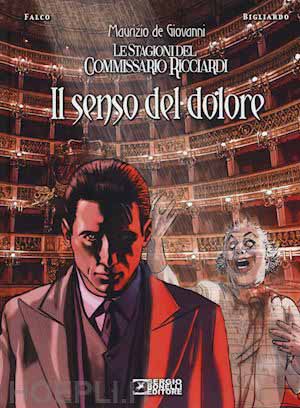

Materiale Bonus! Nomi che parlano
Bonus Materia! Speaking Names
Nelle nostre note del lettore troverai una sezione speciale dedicata al significato dei nomi dei personaggi. A Napoli i cognomi spesso portano con sé echi di soprannomi, origini o tratti caratteristici. Il nome stesso di Ricciardi parla chiaro: riccio richiama il riccio o il riccio di mare, pungente e protetto all’esterno ma tenero e vulnerabile all’interno. Il suo titolo nobiliare di Malomonte evoca al tempo stesso nobiltà e sventura — una “montagna di dolore” che riflette perfettamente il suo destino: elevato, solitario e segnato dal fato.
In our reader notes you’ll find a special section dedicated to the meanings behind the characters’ names. In Naples, surnames often carry echoes of nicknames, origins, or traits. Ricciardi’s name itself speaks volumes: riccio suggests a hedgehog or sea urchin, prickly and guarded on the outside yet soft and vulnerable within. His noble title di Malomonte hints at both aristocracy and misfortune — a “mountain of sorrow” that perfectly reflects his destiny: elevated, solitary, and burdened by fate.
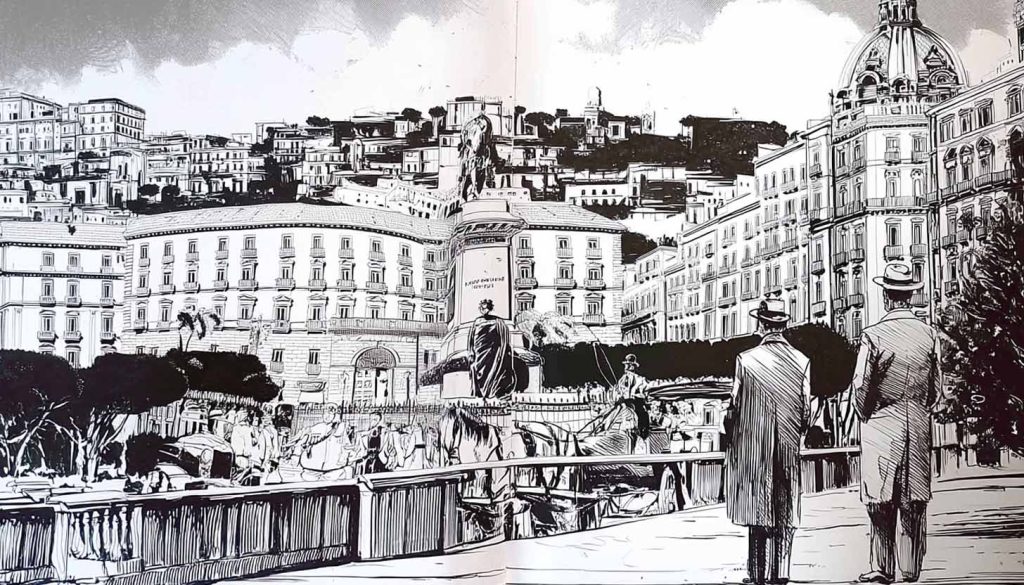
Napoli, Musica, vocabolario e molto di più
Napoli, Music, Vocabulary, and More
Un celebre tenore d’opera viene assassinato — e così il romanzo è naturalmente costellato di musica, arie e frasi toccanti tratte direttamente dal palcoscenico, comprese le ultime, inquietanti parole della vittima. Nelle note del lettore troverai persino clip delle opere citate nella storia, per allenare l’orecchio mentre affini le tue competenze linguistiche.
A world-famous opera tenor is murdered — so naturally the novel is filled with music, arias, and poignant phrases lifted straight from the stage, including the victim’s haunting last words. In the reader notes, you’ll even find clips from the operas featured in the story, so you can train your ear while polishing your Italian skills.
Per accompagnare la lettura, avrai anche a disposizione una lista di oltre 300 parole di vocabolario tratte direttamente dal romanzo — perfetta per imparare, memorizzare e praticare, rafforzando così sia la comprensione sia la fluidità.
To support your reading, you’ll also have access to a vocabulary list of over 300 words taken directly from the novel — perfect for learning, memorizing, and practicing to strengthen both your comprehension and fluency.
Zeroing in on Tricky Vocabulary
We’ll get a clear sense of these classic “false friends” for English speakers:
assistere, prescindere, attendere, pretendere
We’ll practice and learn powerful Italian verbs like assistere, prescindere, attendere, and pretendere. Don’t just read them—see them in action, practice them in context, and truly make them your own.

Iscriviti oggi stesso!
Sign up today!
Visita la pagina del Book Club per maggiori informazioni e per unirti a noi in questa avventura di lettura. Le note, le discussioni e le risorse sono tutte lì che ti aspettano.
Head over to the Book Club landing page to learn more and sign up. Notes, discussions, and resources are waiting for you!
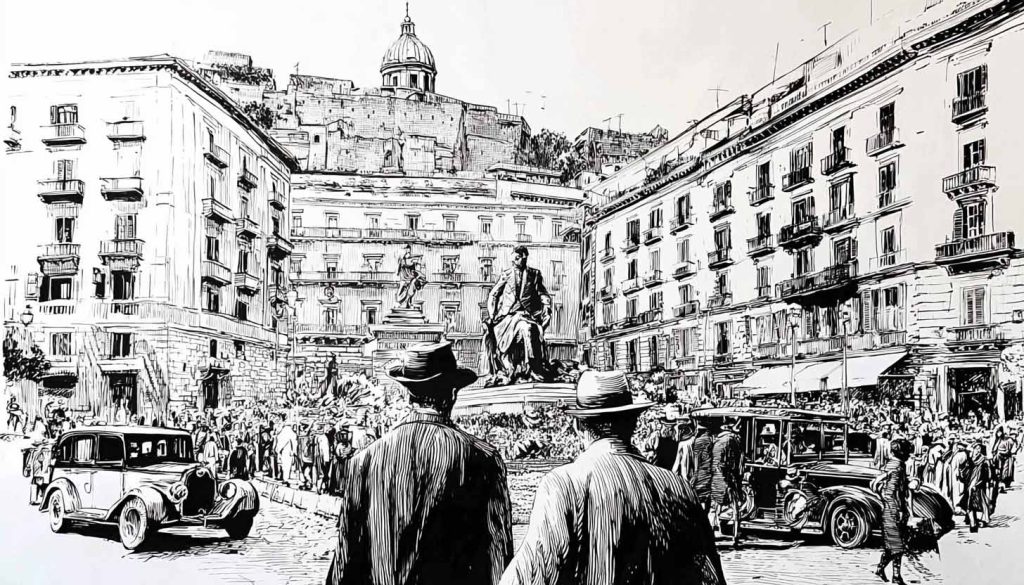
Unisciti al mistero!
Join the mystery!
Leggere in italiano non è mai stato così intrigante! Preparati a camminare per le strade di Napoli, ascoltare i sussurri del passato, e condividere le tue idee con altri appassionati di lingua e letteratura italiana.
Reading in Italian has never been so thrilling! Get ready to walk Naples’ streets, hear whispers from the past, and share your thoughts with fellow Italian language and literature lovers.
🇮🇹 Un consiglio dalla Matta 🇮🇹
Matta Italian Language Tip!

Use of “voi” in the Commissario Ricciardi series of books
Pay close attention to the use of “voi” in the dialogues! In the 1930s, under the Fascist regime, “lei” was banned for ideological reasons and replaced with “voi.” Reading a novel from this period is also a journey into the history of the Italian language!
How do address people in Italian
These days, Italians generally use the formal “Lei” when addressing someone they’ve just met, reserving the familiar “tu” for friends, family, and close acquaintances. Curious about how Italians decide when to switch from formality to familiarity? Explore the nuances of dare del Lei and dare del tu.
Another Matta Tip: If you’d like to print or create a PDF of this post you can easily do so using the Chrome Browser Extension —-> GoFullPage! It works beautifully!
